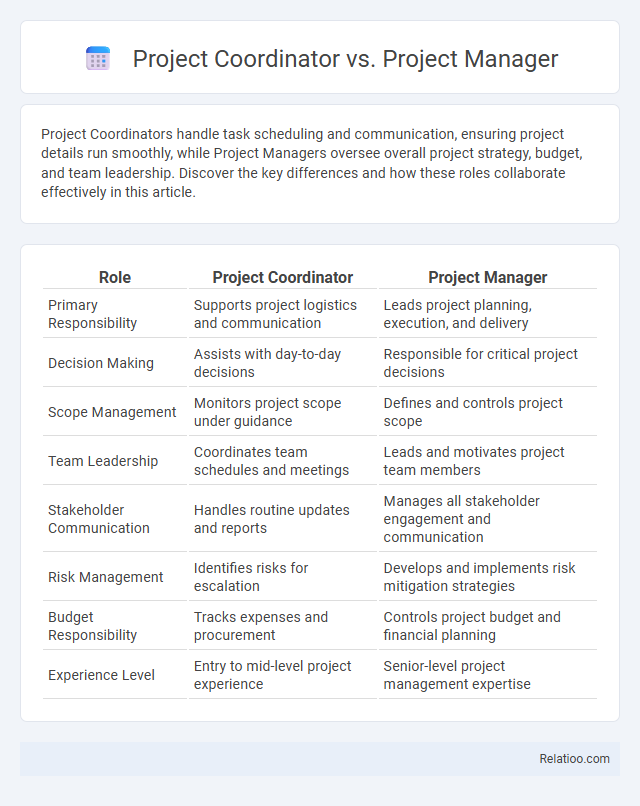Project Coordinators handle task scheduling and communication, ensuring project details run smoothly, while Project Managers oversee overall project strategy, budget, and team leadership. Discover the key differences and how these roles collaborate effectively in this article.
Table of Comparison
| Role | Project Coordinator | Project Manager |
|---|---|---|
| Primary Responsibility | Supports project logistics and communication | Leads project planning, execution, and delivery |
| Decision Making | Assists with day-to-day decisions | Responsible for critical project decisions |
| Scope Management | Monitors project scope under guidance | Defines and controls project scope |
| Team Leadership | Coordinates team schedules and meetings | Leads and motivates project team members |
| Stakeholder Communication | Handles routine updates and reports | Manages all stakeholder engagement and communication |
| Risk Management | Identifies risks for escalation | Develops and implements risk mitigation strategies |
| Budget Responsibility | Tracks expenses and procurement | Controls project budget and financial planning |
| Experience Level | Entry to mid-level project experience | Senior-level project management expertise |
Introduction: Defining Project Coordinator and Project Manager
A Project Coordinator supports project managers by handling administrative tasks, scheduling, and communication to ensure seamless workflow. A Project Manager holds overall responsibility for planning, executing, and closing projects, managing resources, risks, and stakeholder expectations. Your understanding of these roles helps optimize team efficiency and project success.
Key Roles and Responsibilities
A Project Manager leads the project by defining scope, managing timelines, and ensuring deliverables align with business goals, while a Project Coordinator supports by handling administrative tasks, scheduling, and communication among team members. Coordinators primarily focus on organizing resources and facilitating workflow without the strategic decision-making authority held by Project Managers. Understanding the distinction helps you assign roles effectively to optimize project execution and team productivity.
Core Skills and Qualifications
Project Coordinators excel in organizational skills, communication, and multitasking, focusing on supporting project teams, scheduling, and documentation, requiring a bachelor's degree and proficiency in project management software. Project Managers demonstrate leadership, strategic planning, risk management, and decision-making abilities, often holding a PMP certification and extensive experience in managing project life cycles from initiation to completion. Coordinators may have a broader role beyond projects, emphasizing administrative skills, attention to detail, and process coordination, with qualifications varying by industry but generally including strong interpersonal and time management capabilities to ensure your projects stay on track.
Hierarchical Position and Authority
The Project Manager holds the highest hierarchical position, responsible for overall project success, decision-making authority, and strategic planning. The Project Coordinator supports the manager by handling administrative tasks, scheduling, and communication but typically lacks formal authority over the project's direction. Your role as a Coordinator involves facilitating project flow and team collaboration without the leadership responsibilities that come with a Project Manager position.
Typical Tasks and Daily Activities
Project Coordinators typically handle scheduling, resource allocation, and communication among team members to ensure project timelines are maintained. Project Managers oversee the entire project lifecycle, including planning, execution, risk management, and stakeholder engagement, while making strategic decisions to achieve project objectives. Coordinators focus on administrative support, data collection, and facilitating meetings to keep project details organized and progress transparent.
Collaboration and Communication Differences
Project Coordinators primarily facilitate communication by managing schedules, tracking progress, and ensuring information flow among team members, whereas Project Managers lead collaboration efforts by defining project goals, delegating tasks, and resolving conflicts. Coordinators typically handle administrative support and logistical coordination, enabling seamless teamwork without direct decision-making authority. Effective collaboration in project management hinges on the Project Manager's strategic oversight combined with the Coordinator's operational support to maintain clear communication channels.
Decision-Making Power and Accountability
Project Managers hold the highest decision-making power and accountability, overseeing project scope, budget, and team performance to ensure successful delivery. Project Coordinators support Managers by managing schedules and communications but have limited authority on critical project decisions. Your role as a Coordinator typically involves executing assigned tasks with accountability for specific deliverables rather than overall project outcomes.
Salary and Career Progression
Project Managers typically earn higher salaries than Project Coordinators and Coordinators, with average annual wages ranging from $75,000 to $110,000 depending on industry and experience. Career progression for Project Coordinators often leads to Project Manager roles, where increased responsibility, strategic planning, and leadership skills contribute to salary growth. Coordinators generally have more specialized or administrative roles with lower salary ranges but can advance by gaining project management certifications or moving into project coordination leadership positions.
Industry Applications and Work Environments
Project Coordinators, Project Managers, and Coordinators each play distinct roles across various industries, with Project Managers overseeing project planning and execution in sectors like construction, IT, and healthcare. Project Coordinators typically support project managers by handling administrative tasks and communication within corporate, nonprofit, and industrial environments. Your choice between these roles depends on the level of responsibility and the specific work environment, with Coordinators often involved in broader office functions beyond project-focused industries.
Choosing the Right Role for Your Career Path
Choosing between Project Coordinator, Project Manager, and Coordinator roles depends on your career goals and skill set. Project Coordinators support project teams with scheduling and communication, ideal for those developing organizational expertise. Project Managers oversee project planning, execution, and delivery, suited for professionals seeking leadership and decision-making responsibilities, while general Coordinators manage administrative tasks across various departments, providing a broader but less specialized experience.

Infographic: Project Coordinator vs Project Manager
 relatioo.com
relatioo.com